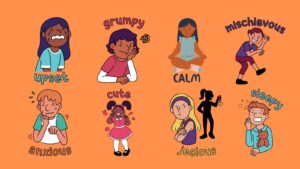Last month I was talking to one of my students about a book he was reading. The teenager was eager to tell me about the wonderful adventures of a little girl who was able to change the energy in a whole town. Feeling excited, I wanted to hear more about it… sorry, that’s not exactly true… I knew that reading the book was a MUST.
 This is how I found out about Pollyanna, the best-selling 1913 novel by Eleanor H. Porter. How could I have missed such a treasure?
This is how I found out about Pollyanna, the best-selling 1913 novel by Eleanor H. Porter. How could I have missed such a treasure?
For those of you who are not familiar with the book, it tells the story about a young orphan, called Pollyanna, who goes to live with her wealthy but stern Aunt Polly. The little girl’s positive outlook helps the local people to find the GOOD in life and become better and more positive.
After reading this powerful novel, I couldn’t help sharing it with my other students. I have to admit that while enjoying this heart-warming book, I was journaling a lot. I knew I had to share Pollyanna’s insights, so here’s what my students and I have learnt from this cheerful little girl:
Life should not be wasted
One of the characters whose life Pollyanna transforms is Mrs Snow. When the little girl visits the sick and grumpy woman for the first time, Mrs Snow complains that she was not able to sleep the previous night. To which Pollyanna responds:
“O dear, I wish I didn’t,” sighed Pollyanna, placing the jelly on the little stand and seating herself comfortably in the nearest chair. “You lose such a lot of time just sleeping! Don’t you think so?”
“Lose time—sleeping!” exclaimed the sick woman.
“Yes, when you might be just living, you know. It seems such a pity we can’t live nights, too.”
Later on, the reader is told that “Mrs. Snow had lived forty years, and for fifteen of those years she had been too busy wishing things were different to find much time to enjoy things as they were.”
Let’s play THE GLAD GAME
When Pollyanna moves to the town of Beldingsville, she finds out that most of the local people are quite sad and ungrateful. It is then that we are introduced to her GLAD GAME. At the beginning of the book Aunt Polly punishes Pollyanna for being late by giving her only bread and milk for dinner. However, Pollyanna does not seem to be bothered and tells the servant Nancy: “I don’t see any trouble about being glad about that.”
Intrigued, Nancy wants to find out more about the GLAD GAME, to which Pollyanna explains:
“Well, that’s the game, you know, anyway.”
“The—GAME?”
“Yes; the ‘just being glad’ game.”…“ Father told it to me, and it’s lovely,” said Pollyanna. “We’ve played it always, ever since I was a little, little girl..”
“What is it? I ain’t much on games, though.”
Pollyanna laughed again, but she sighed, too; and in the gathering twilight her face looked thin and wistful.
“Why, we began it on some crutches that came in a missionary barrel.”
“CRUTCHES!”
“Yes. You see I’d wanted a doll, and father had written them so; but when the barrel came the lady wrote that there hadn’t any dolls come in, but the little crutches had. So she sent ‘em along as they might come in handy for some child, sometime. And that’s when we began it.”
“Well, I must say I can’t see any game about that, about that,” declared Nancy, almost irritably.
“Oh, yes; the game was to just find something about everything to be glad about—no matter what ‘twas,” Pollyanna said, earnestly. “And we began right then—on the crutches.”
“Well, goodness me! I can’t see anythin’ ter be glad about—gettin’ a pair of crutches when you wanted a doll!”
Pollyanna clapped her hands.
“There is—there is,” she crowed. “But I couldn’t see it, either, Nancy, at first,” she added, with quick honesty. “Father had to tell it to me.”
“Well, then, suppose YOU tell ME,” almost snapped Nancy.
“Goosey! Why, just be glad because you don’t—NEED—‘EM!” exulted Pollyanna, triumphantly.
“You see it’s just as easy—when you know how!”
So did Pollyanna convince you to play the GLAD GAME with your students? My pupils love it and admittedly they look forward to telling me what they are glad about.
We should help the underprivileged
One of Pollyanna’s friends is the orphan Jimmy Bean who is threatened with being thrown out from the local orphanage. Pollyanna desperately tries to find someone to adopt him because she believes that nobody should live on the streets. She bravely addresses her wealthy aunt as well as the Ladies’ Aiders, a local women’s organisation, to find some help. Despite her unfruitful attempts, she was not undeterred to help the underprivileged boy.
How the case is resolved, you and your students will find at the end of the book.
Be compassionate
As mentioned beforehand, Pollyanna helps many people in the town. For instance, she helps grumpy people find joy in their daily lives, a quarrelling couple discover a way to save their marriage and the Reverend fill his sermons with hope and love. The girl with the heart of gold brings joy wherever she goes because she has the time and patience to listen to people, help them and bring hope. Pollyanna’s compassionate nature turns life around in the small town.
What comes around goes around
At the end of the book, Pollyanna is run over by a car. Unfortunately, her legs are badly damaged and for once, the “GLAD girl” becomes depressed. The sad news quickly spreads around and a throng of thankful local people head to Aunt Polly’s house to see the injured girl. The readers see a remarkable outpouring of love, compassion and gratitude. Everyone whose life has been changed by Pollyanna wants to restore her faith and bring the smiles back.
Will Pollyanna be able to walk and play the GLAD game again? I’ll leave this to you to find out.




